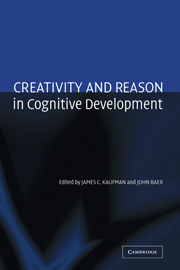Book contents
- Frontmatter
- Contents
- List of Contributors
- Acknowledgments
- Creativity and Reason in Cognitive Development
- Introduction
- COGNITIVE PERSPECTIVES
- DEVELOPMENTAL AND EDUCATIONAL PERSPECTIVES
- 12 Creativity in Young Children's Thought
- 13 A Young Artist's Story: Advancing Knowledge and the Development of Artistic Talent and Creativity in Children
- 14 Is It Reasonable to Be Creative?
- 15 Does Culture Always Matter: For Creativity, Yes, for Deductive Reasoning, No!
- 16 Higher Level Thinking in Gifted Education
- 17 The Relationship Among Schooling, Learning, and Creativity: “All Roads Lead to Creativity” or “You Can't Get There from Here”?
- 18 How Early School Experiences Impact Creativity: An Ecological Perspective
- 19 Conclusions
- Author Index
- Subject Index
- References
15 - Does Culture Always Matter: For Creativity, Yes, for Deductive Reasoning, No!
Published online by Cambridge University Press: 19 January 2010
- Frontmatter
- Contents
- List of Contributors
- Acknowledgments
- Creativity and Reason in Cognitive Development
- Introduction
- COGNITIVE PERSPECTIVES
- DEVELOPMENTAL AND EDUCATIONAL PERSPECTIVES
- 12 Creativity in Young Children's Thought
- 13 A Young Artist's Story: Advancing Knowledge and the Development of Artistic Talent and Creativity in Children
- 14 Is It Reasonable to Be Creative?
- 15 Does Culture Always Matter: For Creativity, Yes, for Deductive Reasoning, No!
- 16 Higher Level Thinking in Gifted Education
- 17 The Relationship Among Schooling, Learning, and Creativity: “All Roads Lead to Creativity” or “You Can't Get There from Here”?
- 18 How Early School Experiences Impact Creativity: An Ecological Perspective
- 19 Conclusions
- Author Index
- Subject Index
- References
Summary
The work of Nisbett, Peng, Choi, and Norenzayan (2001) on culture and systems of thought has drawn much attention of psychologists. The authors presented a strong and provocative view of cultural influence on human cognition. According to Nisbett et al. culture can influence not only our belief systems, languages, and social cognitive systems but also how we perceive and think, which are very basic cognitive processes. Their paper reviewed studies showing how culture penetrated almost every aspect of our cognitive processing, such as focus of attention, cognitive control, knowledge acquisition, attribution, prediction and “postdiction” (ad hoc explanation), reasoning, cognitive styles, categorization, judgment, and problem solving.
Is the influence of culture on cognition as pervasive as Nisbett et al. suggested? In this chapter, we examine the extent of cultural influence on human thinking by focusing on two types of thinking: deductive reasoning and creativity, which are both fundamental human abilities but commonly considered involving different cognitive processes.
To many psychologists, deductive reasoning and creativity are like two antitheses, representing two modes of thinking (e.g., de Bono, 1991; Johnson-Laird, 1987, 1993; Lavric, Forstmeier, & Rippon; 2001; Runco, 2002; Sternberg & O'Hara, 1999). Johnson-Laird, for example, once stated that the cognitive process of human creativity was beyond a scientific explanation and certainly different from that of logical reasoning (1987). De Bono (1991), who invented the terms vertical and lateral thinking, roughly paralleling the contrast between analytical and creative thinking, made clear distinctions between these two modes of thinking.
Information
- Type
- Chapter
- Information
- Creativity and Reason in Cognitive Development , pp. 282 - 296Publisher: Cambridge University PressPrint publication year: 2006
References
Accessibility standard: Unknown
Why this information is here
This section outlines the accessibility features of this content - including support for screen readers, full keyboard navigation and high-contrast display options. This may not be relevant for you.Accessibility Information
- 3
- Cited by
